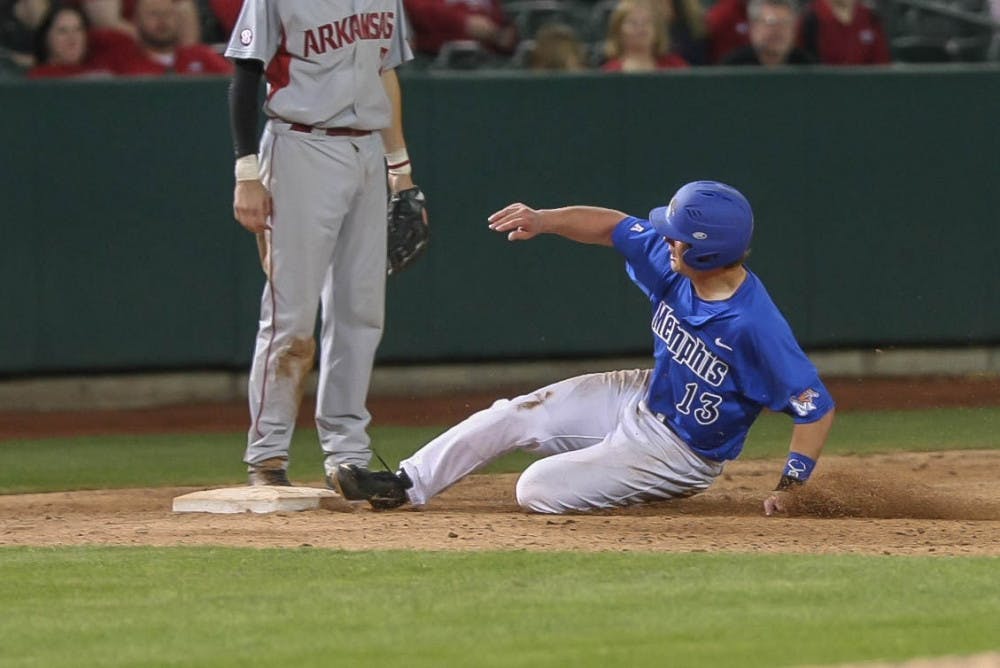When a baseball player’s season is prematurely cut short, the usual culprits are shoulder or elbow injuries.
However almost exactly one year ago, University of Memphis baseball outfielder Chris Carrier was ruled out for his sophomore season after being diagnosed with a much more serious condition — a blood clot.
A blood clot is far from the typical baseball injury, but while the recovery can be much quicker than a Tommy John surgery, it’s also much more serious. Unlike the types of injuries you’d usually expect baseball players to have, blood clots can be potentially life-threatening if they travel to the lungs or other major organs.
Like many people, Carrier wasn’t aware of the significance until it affected him.
“When I first found out I wasn’t really too worried about it because I didn’t really know how serious a blood clot was,” the junior outfielder said. “(Athletic trainer Brock Potter) told me ‘I’m really sorry man,’ and I was like ‘I don’t know what you’re talking about. I don’t think it’s a big deal. I’ll be fine in a week or so,’ but after a while I started figuring out that it was pretty serious.”
Carrier got the clot in April of last year, when he was practicing in the batting cages with then-senior Tucker Tubbs, who noticed that something was wrong and took him to the athletic trainer.
“When he came to see me his arm was about as blue as my (Tiger blue jacket) here, and it was about twice the size it was supposed to be,” Potter said.
Potter and the team doctor decided the best course of action was to head to the emergency room. Carrier went through surgery, having his top rib removed in the process, and stayed in the hospital for about a week. He was forced to rest until June, when he was finally able to work out again.
According to Potter, who assisted Carrier with his recovery, the orthopedic part of the rehab took only 6-8 weeks, but blood thinners prevented him from playing baseball until October.
But by the time Memphis’ 2016 season ramped up in mid-February, Carrier showed no signs of being affected by his shortened offseason. After batting .254 in his sophomore year, he started out this season red hot, batting a blistering .360 in his first 75 at bats. Carrier also surpassed his career-high in doubles, hitting eight this year compared to seven last season.
Carrier has been in a slump since the lightning fast start, with only two hits in his last 28 at bats, but if a slump was going to come, he’s glad that it’s happening now rather than later.
“I just need to keep grinding in the cages and keep listening to the coaches and see what I’m doing wrong,” Carrier said. “It’s better to have a slump right now than at the end or at the beginning, because at the end it’s (conference play) and hopefully I’ll get it back, get hot again, and get the team rolling.”
Memphis’ offense could certainly use a jump-start. The Tigers are just 10-17 this season after a highly successful 2015 season saw the team win 37 games, and the team is currently hitting only .257 this year — ranking sixth among eight teams in the American Athletic Conference.
But while the Tigers are in need of his hitting, Carrier’s health is still top priority, and even though he had no history of blood clots before last year’s injury, he could potentially be at risk again in the future.
The most recent high-profile example is Miami Heat star forward Chris Bosh, who missed the second half of the 2014-15 season after being treated for blood clots in his lungs in February. Bosh returned to action this season, only to be sidelined once again, almost exactly one year since the initial scare.
“There’s always the risk, the way Chris is built with his body type it’s always possible, but that was the whole deal with (removing) the first rib,” Potter said on Carrier’s odds of more blood clots in the future. “It’s hopefully opening up room for those muscles to not pinch on the vein, and hopefully it’ll keep the clot out of the vein. There’s always risk, but hopefully we’ve reduced that risk.”
In the meantime, Carrier and the Tigers’ next chance to break out of their slump will come Wednesday night, when Memphis faces off against the Arkansas Razorbacks at AutoZone Park. First pitch is set for 6:30 p.m.
University of Memphis outfielder Chris Carrier slides on base in a game in the 2015 season. Carrier successfully returned to the team this season after suffering a season-ending blood clot last season.






